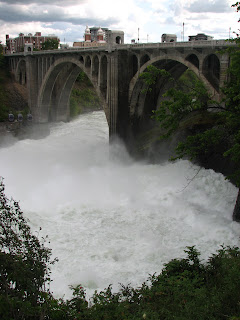So I got back to Seattle late tonight and am leaving again early tomorrow morning for Anchorage but, I wanted to share some insights I gathered from the National Tribal Forum on Air Quality (NTF) I attended this past week.
The NTF conference was sponsored by the EPA, the National Tribal Air Association (NTAA) and the Institute for Tribal Environmental Professionals (ITEP). This means that the approach was a compilation of academic presentations, regulatory emphasis, and a venue for tribes to communicate with each other about their current needs and projects. There were tribes represented from all across the nation and I learned so much about the relationship between tribes and federal agencies like the EPA. There was a huge emphasis on tribal sovereignty and their right to be a part of regulatory processes right from the beginning.
Funding was another issue that was heatedly debated because many tribes want to come to the table and participate in major inter-governmental efforts on climate change adaptation but many do not have the resources to get there. One cool effort I did learn about were Landscape Conservation Cooperations (LCC) which are made up of all the federal resource management agencies like U.S. Fish and Wildlife (FWS), United States Geological Survey (USGS), and the Bureau of Land Management (BLM), state governments agencies, and tribal organizations. They have segmented the country into 22 different LCCs according to ecosystem and migratory pathway zones and are collaboratively working on collecting scientific data and identifying management solutions to many ecological concerns like climate change. This kind of large scale effort rarely happens across agencies so it is cool to see it happening.
I attended the breakouts in the Climate Change track and was able to hear different tribes present their work on the adaptation and mitigation efforts they are pursing on their own reservations. They are all aware of the problems they are facing. For example, the members of the Nez Perce tribe located in northern Idaho are salmon people and usually start their fishing efforts in early May. However, because of irregular stream temperatures the salmon are “frozen” farther upstream and haven’t yet made their way down to the reservation. This has an obvious impact on the livelihoods of tribal members. While the problems may be readily apparent, the solutions and adaptations to these problems are much harder to implement.
The Swinomish tribe along the western coast of Washington has a very comprehensive adaptation plan developed after two years of assessment and study. But even their tribe is having difficulty with implementation partly due to funding and partly because of the geography of their reservation land. Options like abandonment of land or movement of people is not very easy to do when your culture and livelihoods are inextricably tied to your small plot of federally recognized land. Many of the issues tribes highlighted throughout the conference were Environmental Justice issues and the EPA has developed an EJ office focused on reaching marginalized communities.
Hearing from some Alaskan natives put a face to the challenges I have been reading about concerning the devastating effects of climate change on their natural landscapes and culture. In conversations with people I felt the urgency to find practical and immediate solutions to the problems they were experiencing but also have noted the severe lack of options and examples for them to follow. My job continues to get more challenging but I am learning so much along the way. I met with David Guest, a senior policy analyst from EPA headquarters in Washington D.C., and he has been a great resource and encouragement.
I attended a dinner one night featuring a drum group from a local reservation and was amazed at the subtle differences and beauty in their songs of celebration, lament, and honor. There is also always an invocation at the beginning and end of the sessions and it is offered in the man’s native tribal language. One speaker even made a comment that their spiritual beliefs were similar to Christianity because they believed in respect for self, others, and the environment around them. There are some important differences in our religious beliefs yes, but I am not hesitant to say that they certainly do a much job of respecting creation than we often do in the western church.
Well, off to Alaska tomorrow! Will have a lot more to learn and experience there. Enjoy the following pictures of Spokane - I had to explore a little while I was there.




Sounds like you are learning so much. It's really fascinating! Yes, they do a much better job of taking care of the environment than the Western church has. We can learn so much from them.
ReplyDeleteLove you and I'm praying for you!